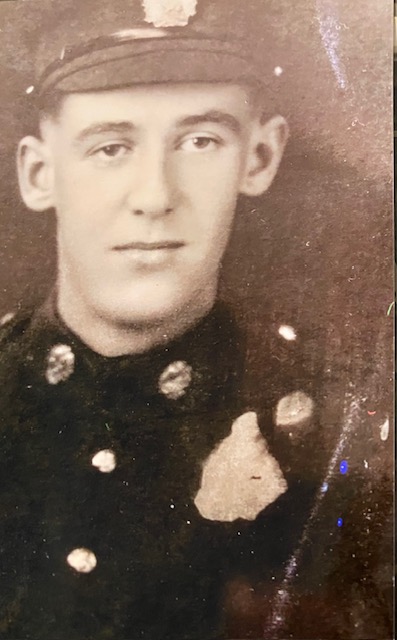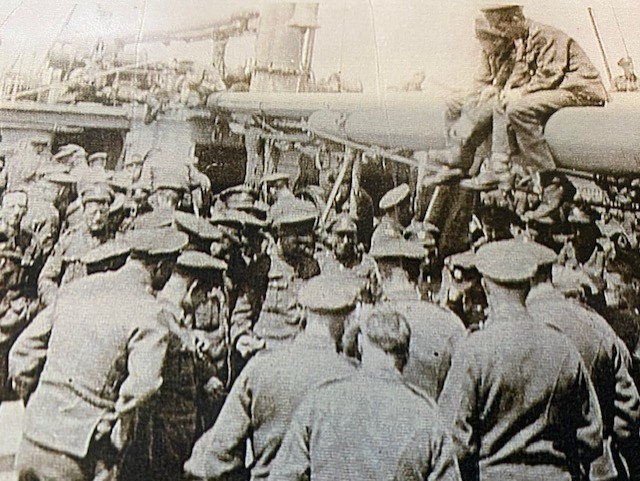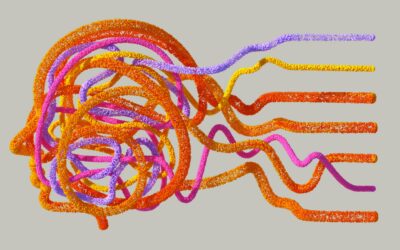 This month, on November 11th, we’ll take two minutes to pause, reflect on the sacrifice made by those who have served during times of conflict. I make a point each year of going through the old black and white photos I have of relatives who were in the army.
This month, on November 11th, we’ll take two minutes to pause, reflect on the sacrifice made by those who have served during times of conflict. I make a point each year of going through the old black and white photos I have of relatives who were in the army.
There’s an old photo from WW1 of my grandfather. He lied about his age so he could join the Canadian Army. After training camp, he was shipped overseas for a brief stop in England. The photo is taken as he sits next to a buddy looking down on the rest of the soldiers on deck. He writes on the back: “training complete, enjoying my time across the pond. The lads and I are feeling just fine. Will write again soon.” Shortly after the picture was taken, he landed in the Battle of Vimy Ridge, was badly wounded and returned to a veteran’s hospital in Winnipeg.
How I wish we had more letters! It’s hard to imagine his cataclysmic shift from Saskatchewan prairie boy to private in one of WW1’s most significant battles. There were literally millions of letters written during the course of both the first and second world wars. Did they all reach their destination? The very exercise of writing those letters no doubt proved to be a healing conduit. Expressing their emotions gave release from trauma and the ability to focus on the task at hand.
While I have always journaled for the pure enjoyment of it, I discovered after brain injury the absolute therapeutic benefit of this practice. After my accident it seemed that mornings in particular would begin with an overwhelming cascade of jumbled thoughts, broken memory, and a sense of panic. It was difficult to remember where I was and what I had to do. My focus was so limited, surfacing then evaporating like morning mist. I kept paper and pen by my bed and would scrawl out the few words I could manage. I hoped my scribbles would be clues, like a trail of breadcrumbs, which would somehow lead me back to the land of normal I had lost.
At times, my brain seemed like a radio with poor reception, static buzzing, and senseless din. I found my anxiety ease as I was able to write down my thoughts. I could come home to a familiar part of myself, create some order amidst the chaos. Here my brain could clarify, comfort, prioritize and synchronize the day at least to a minimal extent. This daily habit of paper and words was a cleansing cathartic practice for me.
I would encourage anyone to begin a daily habit of journaling. Many studies have shown it is an effective way to boost our ability to cope with intrusive and avoidant thoughts, freeing up mental space for memory. It actually helps to ease the psychological distress we have in reaction to trauma, and it helps to improve gratitude. You can get to know yourself by revealing your most private fears, thoughts, and feelings. Look at your writing time as personal relaxation when you can de-stress and wind down.
to cope with intrusive and avoidant thoughts, freeing up mental space for memory. It actually helps to ease the psychological distress we have in reaction to trauma, and it helps to improve gratitude. You can get to know yourself by revealing your most private fears, thoughts, and feelings. Look at your writing time as personal relaxation when you can de-stress and wind down.
During WW2 Charity Adams and the 6888 Brigade were given the task of sorting through tons of unclaimed mail. Stationed in Birmingham England in 1944 they combed through correspondence and connected lost mail to soldiers stationed across Europe. It’s an interesting story and well worth the read. It had a profound effect on morale when men received those letters. It was also the exercise of writing that enabled troops to deal with their trauma, regardless of whether or not their letter reached home.
Next month in December children everywhere will write a letter to Santa. Will it arrive safely at the North Pole? Perhaps the biggest benefit of those letters will be an expression of dreams, hopes, and wishes for the future. Maybe even a healthy bit of self-evaluation; is my behaviour naughty or nice?!
As the Christmas Season is fast approaching, why not give yourself a journal?
I hope you’ll take up the challenge and enjoy the many benefits of writing letters to yourself.


